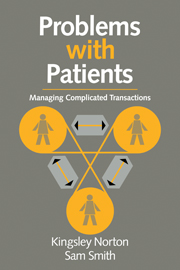Book contents
- Frontmatter
- Contents
- Foreword by Professor Paul Freeling, O.B.E.
- Preface
- Acknowledgments
- 1 Doctor–patient interaction
- 2 The clinical transaction
- 3 Interpersonal influences
- 4 The influence of past relationships
- 5 Contextual influences
- 6 Managing complicated clinical transactions
- 7 Interventions in complicated clinical transactions
- 8 Implications for the clinical setting
- 9 Implications for training
- Appendix I Clinical phenomena related to ‘problem patients’
- Appendix II Personality disorder
- References
- Index
6 - Managing complicated clinical transactions
Published online by Cambridge University Press: 19 March 2010
- Frontmatter
- Contents
- Foreword by Professor Paul Freeling, O.B.E.
- Preface
- Acknowledgments
- 1 Doctor–patient interaction
- 2 The clinical transaction
- 3 Interpersonal influences
- 4 The influence of past relationships
- 5 Contextual influences
- 6 Managing complicated clinical transactions
- 7 Interventions in complicated clinical transactions
- 8 Implications for the clinical setting
- 9 Implications for training
- Appendix I Clinical phenomena related to ‘problem patients’
- Appendix II Personality disorder
- References
- Index
Summary
Introduction
The majority of clinical transactions in primary care settings are routine and straightforward enough to warrant no special attention or modification to their management. The professional relationship seems able to cope with any tendency to wander away from important clinical goals, so that whatever else is also dealt with in the transaction, these are not neglected. But probably at least once in every clinic list the doctor will be left after a consultation with the uncomfortable feeling that something, even if it cannot be exactly defined, was not as it should have been. Sometimes, whole clinic lists can feel like this. Afterwards, the doctor might resentfully think that had it not been for a particular patient all would have been well. Was it, however, the patient's unreasonable behaviour or the receptionist's interruption in the previous consultation or the quarrel before leaving home, that sowed the seed of discontent?
The clinical transaction represents a process that takes place over time, either within a single consultation, or over more prolonged periods and multiple meetings. The doctor must be aware, therefore, of the particular stage of the transaction at any given point, since this bears on the requirements of the interaction (public and personal) at that moment. In the early stages of the transaction, establishing a rapport and a meaningful therapeutic alliance with the patient are important tasks to be addressed. Later, the need to impart information or instructions may take precedence. Later still, disengagement and any associated difficulties with endings may become issues that need attention. To an extent, the shorter the overall length of the transaction the more important are its beginning and ending.
- Type
- Chapter
- Information
- Problems with PatientsManaging Complicated Transactions, pp. 84 - 103Publisher: Cambridge University PressPrint publication year: 1994

